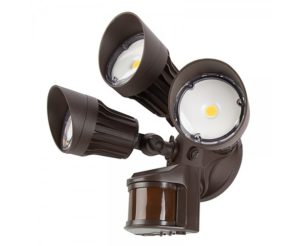Motion sensing lights can be a beneficial addition to your home security system. Here are some of the pros and cons of using them.
Pros of Motion Sensing Lights for Home Security
- Deterrence: Perhaps the most obvious benefit is that motion sensing lights can deter potential burglars. When someone approaches your property and the lights suddenly turn on, it gives the impression that someone is home or that they have been spotted, which can scare off intruders.
- Improved Safety: Motion sensor lights can make your property safer by illuminating dark areas as you approach. This can be particularly useful in preventing accidents, like tripping over something in the dark, and can make you feel more secure when returning home late at night.
- Energy Efficiency: Because they only turn on when motion is detected, these lights can be more energy efficient than traditional outdoor lights that are left on throughout the night. This could result in significant savings on your electricity bill over time.
- Automated Convenience: Since they turn on and off automatically, motion sensor lights require less manual operation. This can be especially convenient if you’re carrying groceries or other items into the house and can’t easily reach the light switch.
- Evidence Collection: If your motion sensor lights are connected to a security camera, they can help provide better visual documentation of events that happen around your property. This can be useful for identifying intruders or for verifying events in case of a dispute.
- Versatility: Motion sensor lights come in a variety of styles and configurations, enabling you to find a solution that fits your specific needs and property layout. Some are standalone units, while others can be integrated with larger home security systems.
- Increased Property Value: Having a well-maintained and secure property can boost its value. If you decide to sell your home, prospective buyers may appreciate the added security and convenience that motion sensing lights provide.
Remember, while motion sensor lights are beneficial, they are most effective when used as part of a comprehensive home security strategy. This may include measures like door and window locks, alarm systems, and security cameras.
Cons of Motion Sensing Lights for Home Security
- False Alarms: Motion sensor lights can be activated by animals, passing cars, or even branches moving in the wind. This could cause the lights to turn on and off frequently, which can be annoying and might make you desensitized to the activation of the lights, potentially ignoring them when a real threat is present.
- Limited Range: Motion sensors can only detect movement within a certain range and field of view. If an intruder approaches from an area outside of this range, the lights won’t activate. This can leave blind spots in your security setup unless you install multiple units.
- Movement-Based Activation: Since these lights are activated by motion, someone moving very slowly or staying still may not trigger the lights. Similarly, once activated, the lights will typically switch off after a set period without movement, potentially allowing someone to move undetected once the lights go out.
- Potential for Vandalism: If placed within reach, motion sensor lights can be vandalized or tampered with, disabling them and leaving areas of your property dark. Intruders might unscrew or break the bulbs, or even cover the sensor.
- Maintenance: Motion sensor lights require regular maintenance. Outdoor lights, in particular, may be affected by weather conditions and require frequent checks. The bulbs will need to be replaced when they burn out, and over time, the sensors themselves may become less reliable and require replacement.
- Dependence on Power: Like all electrically powered devices, motion sensor lights depend on a consistent power source. During power outages, your lights won’t function, leaving your home more vulnerable.
Remember, despite these potential disadvantages, motion sensor lights can still be a valuable part of a broader home security strategy, complementing measures like door and window locks, alarm systems, and surveillance cameras.

